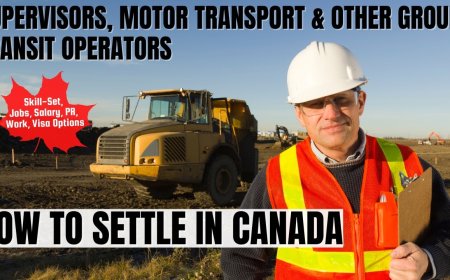Managers in transportation Canada Immigration Overview: Key Insights on Salaries, Employment, and Regional Advantages
Welcome to the pathway to Canada immigration for skilled professionals and trade workers. This guide is specifically tailored for Managers in transportation looking to work and settle in Canada, offering a deep dive into the essential aspects of immigration and employment in this field.
Introduction
Canada is known for its strong economy and diverse job opportunities, making it an attractive destination for professionals seeking career growth and stability. In this article, we will focus on the career and immigration prospects in Canada for Managers in transportation, with a National Occupation Classification code (NOC Code) of 0731. We will delve into the profile description, main job duties, education and licence requirements, skills needed, median age and retirements, salary details, and possible visa options for aspiring transportation managers looking to establish themselves in Canada.
What is the Profile Description of a Managers in transportation as per the Canadian National Occupation Classification (NOC) Standards?
Transportation operations managers are responsible for overseeing the planning, organization, direction, control, and evaluation of transportation companies such as railways, airlines, bus lines, transit systems, shipping lines, and trucking companies. They work under the guidance of a general manager or another senior manager. Additionally, freight traffic managers are tasked with coordinating the transportation and movement of goods within companies or departments. They are employed by transportation, freight forwarding, and shipping companies, as well as transportation departments within retail, manufacturing, and utility sectors.
What are the Main Job Duties of a Managers in transportation in Canada?
- Plan, organize, and direct the operations of a transportation company, including setting policies and standards for safety compliance
- Manage the dispatch, maintenance, and service of vehicles, vessels, or aircraft
- Control the budget, oversee performance, and prepare reports for senior management
- Recruit and train personnel, ensuring they adhere to company policies and regulations
- Coordinate and monitor the transportation and movement of goods, negotiating rates and overseeing shipping documentation
What are the Education, Certifications, and Licensing Requirements to Work as Managers in transportation in Canada?
Requirements for Managers in Transportation To become a Manager in transportation operations, candidates typically need a bachelor's degree in business administration or engineering. Experience in transportation operations, especially in a supervisory role, is also necessary. Candidates with extensive experience in a specific transport mode, such as being a pilot, train engineer, vessel master, or truck driver, may be able to substitute formal education. Additionally, certification as an operator in a specific mode of transportation, such as a commercial pilot, vessel master, or truck driver, is usually required. For Managers in transportation freight traffic, a high school diploma is a minimum requirement. However, a college diploma or university degree in business or transportation administration may also be necessary. Candidates must have several years of experience in clerical, operational, or administrative roles related to freight traffic.
What Essential Skills are Required for Managers in transportation to succeed in Canada?
Successful managers in transportation must possess a variety of essential skills to effectively oversee daily operations. These skills include the ability to arrange shipping documentation, track and trace goods in transit, monitor performance, prepare reports for senior management, plan for schedule and policy changes, establish and implement transport policies and standards, oversee vehicle scheduling and dispatch, negotiate for services and rates, ensure compliance with regulations, and set service rates while monitoring revenue. Additionally, strong organizational, leadership, communication, and problem-solving skills are crucial for managers in transportation to excel in their roles.
What is the Median Age and Retirement Age for Managers in transportation in Canada?
The skilled professionals working as Managers in transportation have a median age of 47.0 years old, with many of them retiring at an average age of 72.0. This suggests that individuals in this field tend to have relatively long and stable careers, with many staying in their positions for a significant portion of their working lives. The combination of experience and expertise acquired over time likely contributes to their success in managing transportation operations effectively and efficiently. Additionally, the relatively later retirement age could indicate that these professionals enjoy their work and find it fulfilling enough to continue working well into their golden years.
How many job openings exist for Other Managers in transportation in Canada, and what's their provincial distribution?
There are a total of 102 job openings for Managers in transportation in Canada. The province with the highest number of job openings is British Columbia with 43 openings, followed by Ontario with 37 openings. Alberta has 11 job openings, while Québec has 7. Saskatchewan has 2 job openings and New Brunswick has 1. British Columbia has the highest number of job openings for Managers in transportation, while New Brunswick has the lowest number of job openings. Overall, there are ample opportunities for individuals looking to work as Managers in transportation across Canada, with varying numbers of job openings in different provinces.
What is the hourly wage or salary of Managers in transportation in different Provinces of Canada?
The wage analysis for Managers in transportation in Canada reveals significant variations across provinces. In British Columbia, the wage ranges from $28.85 as the low end, $38.46 as the median, and $62.50 as the high end. Alberta offers higher wages with a low of $20.00, a median of $44.23, and a high of $64.90. Saskatchewan stands out with the highest wages, ranging from $25.82 at the low end, $40.87 at the median, and $95.38 at the high end. Manitoba, Ontario, and Quebec offer competitive wages with slight variations. Meanwhile, the Atlantic provinces - New Brunswick, Nova Scotia, Prince Edward Island, and Newfoundland and Labrador - offer lower wages compared to the national averages. Newfoundland and Labrador have the lowest wages with a low of $25.64, a median of $30.00, and a high of $49.45. Overall, it is evident that there are significant wage discrepancies for Managers in transportation across different provinces in Canada.
What are the various visa options available for Managers in transportation migrating to Canada?
Managers in transportation are in high demand in Canada and are eligible for Category based Express Entry Invitation draws for Canadian PR under the Transport Occupations Category. The Express Entry Visa Category allows skilled workers to apply for permanent residency based on factors such as age, education, work experience, and language proficiency. In addition, Managers in transportation can also explore Provincial Nominee Programs and Employer Sponsored Work Visas as potential pathways to migration. These programs offer opportunities for skilled workers to obtain visas through provincial endorsements or job offers from Canadian employers. Apart from these options, there may be other Visa options available for Managers in transportation. To know more about these visa options and discuss your migration plans in detail, book an appointment with our professionals today.
Have Questions or Need Assistance?
If you have any queries or require assistance with your immigration plans, we're here to help. Our experienced immigration consultants are ready to provide personalized guidance tailored to your specific needs.
Don't hesitate to reach out and schedule an appointment today. Whether you're seeking clarification on immigration processes, exploring visa options, or need support with documentation, we're dedicated to assisting you every step of the way.
Book an appointment with our team to discuss your immigration goals and receive expert guidance for your journey to Canada.
What's Your Reaction?
 Like
0
Like
0
 Dislike
0
Dislike
0
 Love
0
Love
0
 Funny
0
Funny
0
 Angry
0
Angry
0
 Sad
0
Sad
0
 Wow
0
Wow
0




































































